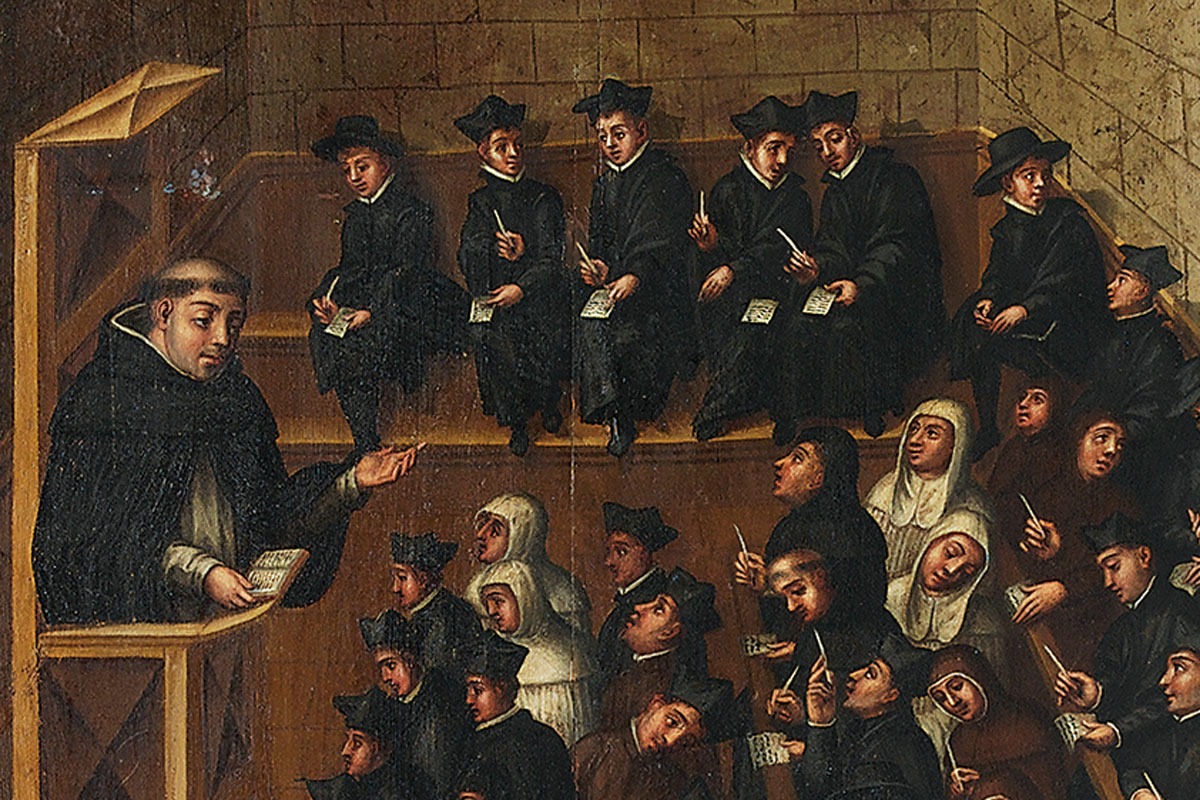Can theology be a science?
An epistemological reflection

Many dubious disciplines have been removed from academic institutions, but theology is not one of them, as it is still taught in respectable universities. This article argues that theology does not deserve that special treatment. Theology has long pretended to be a science, but it can never be, because ultimately, theology is grounded on faith and authority, two tenets that run counter to the scientific method. Natural theology appeals to evidence and reason, but it also fails in its endeavor. More recent theologians admit that their discipline is not science per se, but still consider it legitimate in its quest for meaning. There are also reasons to doubt this claim, as there is no need to appeal to the supernatural to find meaning.
Keywords: theology, science, faith, reason, evidence.
Introduction
There is little doubt that, in the last three centuries, science has made astonishing progress. As Steven Pinker describes it in Enlightenment Now, levels of scientific literacy have risen exponentially ever since the 18th century, and this should be a reason of celebration, especially because greater scientific knowledge impacts other areas of improvement:
[…] some of the causal pathways vindicate the values of the Enlightenment. So much changes when you get an education! You unlearn dangerous superstitions, such as that leaders rule by divine right, or that people who don’t look like you are less than human. You learn that there are other cultures that are as tied to their ways of life as you are to yours, and for no better or worse reason. You learn that charismatic saviors have led their countries to disaster. You learn that your own convictions, no matter how heartfelt or popular, may be mistaken. (Pinker, 2018, p. 235)
To learn some of these things, other things had to be unlearnt. The belief that witches could fly on brooms had to be abandoned. The same could be said of the idea that metals could be transmuted into gold. Science is at odds with superstition, and overall, the advance of scientific knowledge implies the retreat of mistaken ideas that abound in the fantasy-prone magico-religious world. For that very reason, most Western countries are quick to demand that superstitious notions be removed from university courses. If a school of medicine proposes to teach a course on how sticking needles throughout the body helps drain some mysterious cosmic energy (and thus cure disease), that would be met with ridicule. Likewise, if somebody in an institution of higher learning dares to teach how the positions of the stars somehow affect someone’s destiny, that would meet with very strong condemnation. These are all either false or unfalsifiable beliefs that simply have no room in science.
Yet, at the same time, in most Western universities, there are some either false, or more frequently, unfalsifiable beliefs that do get a free pass. If someone teaches about Big Foot or «cosmic energies», they run the risk of being ridiculed. But, if someone teaches about the Antichrist, the Trinity, or Heaven and Hell, somehow they will still have academic respectability.
«Most Western countries are quick to demand that superstitious notions be removed from university courses»
These are the kind of things that the discipline of theology purports to study. Epistemologically speaking, they are not altogether different from the claims made by acupuncture, cryptozoology, or astrology. Yet, somehow, as opposed to those dubious disciplines, theology enjoys a privilege in Western academia.
Theologians have long refused to let go of their privilege, and they frequently try hard to maintain the status quo, as if theology were on the same ranking with science, to the point that theology itself is a science. Take, for example, these words from renowned theologian Thomas Torrance (1972):
Everything about us today tells us that we live in a world which will be increasingly dominated by empirical and theoretic science. This is the world in which the Church lives and proclaims its message about Jesus Christ […] Science is a religious duty, while man as scientist can be spoken of as the priest of creation, whose task it is to interpret the books of nature, to understand the universe in its wonderful structures and harmonies, and to bring it all into orderly articulation, so that it fulfils its proper end as the vast theatre of glory in which the creator is worshipped and praised. (Torrance, 1972)
Naturally, so Torrance believed, the scientist and the theologian can be one and the same, so it only makes sense that Schools of Divinities continue to exist in universities, as they still do in respectable institutions such as Cambridge, Harvard, or Oxford.
This must be challenged. Scientists must present objections not just to parapsychology or Feng Shui, but to theology itself. For too long, theology has been considered the regina scientiarum, the queen of sciences (Huttinga, 2014). The time has come to push back, and make clear that, not only is it not the queen of any science, it is not even a science; in fact, its claims are, just as Jorge Luis Borges would have it, on par with those of fantastic literature.
The problem with dogmatic theology
From the onset, it must be made clear what theology is, and is not. Theology is not just the study of religion. If scholars wish to study religious phenomena, they can legitimately do so employing the scientific tools of sociology, psychology, and even neuroscience. The same goes for the study of the history of religion. Those are perfectly legitimate goals. Religious studies departments in universities should not disappear. Only theology departments should.
The comparison with astrology is relevant in this regard. Is it scientifically worthwhile to study the history of astrology? By all means. An enquiry into how astrological ideas had an impact on the politics and everyday lives of people in Babylon, Persia, Egypt, Greece, and so on, expands our historiographic understanding of those civilizations. But, the moment any of these studies would assume that the position of stars actually do have an impact on behavior, such study would cease to be scientific.

Copy of Raphael’s Allegorical figure of theology, at the Stanza della Segnatura (Vatican Apostolic Palace, Rome, 1508-1509), painted by Cesare Mariannecci in 1864 (aquarelle, 35.6 × 35.5 cm). / National Gallery, 1993
Religious studies can preserve their scientific status, only as long as they are embedded in «methodological secularism» (Henderson, 2008). One cannot study scientifically, say, a séance, and assume that a ghost has actually taken possession of a medium. Likewise, scholars of religious studies must approach their subject matter, but must keep a thoroughly secular perspective. They can study how people relate to their idea of God, but must not assume that God as an actual existent being is involved.
Theology purports to be the «study of God». It does not claim to study how people imagine God to be (again, a very legitimate approach), but rather, how God actually is. To anybody with a minimum of scientific leanings, this ought to present difficulties. How can we even study such an entity? By its very definition, God is imperceptible. How can anybody claim to study that which nobody has ever seen, heard, touched, or smelled? Philosopher Antony Flew famously addressed this question, by telling the tale of two explorers that try to spot an invisible gardener who is not perceptible through any other means. One explorer ultimately gives up on the task of finding such a gardener, by asking: «Just how does what you call an invisible, intangible, eternally elusive gardener differ from an imaginary gardener or even from no gardener at all?» (Flew, 2000).
Traditionally, theologians accept there is no meaningful way we can perceive God. But, so the argument goes, we ought to accept some dogmas by faith, and on the basis of that, we can make sense and rationalize what religion teaches us. This is how, according to the theologian Anselm of Canterbury, theology is fides quaerens intellectum, faith in search of intellect (Adams, 1992). Theologians acknowledge that no experiment can ever tell whether or not the Holy Spirit comes from the Father alone. But, they claim that, by accepting divine revelation, one can systematically organize those doctrines, and that is the task of theology as a science.
Theologians are playing with words. It is important to keep in mind the differences between legitimate scientific disciplines, such as biology or astronomy, and spurious disciplines, such as theology. No science can ever accept any premise on the basis of authority alone. We know that evolution happens, not simply because Darwin says so, but rather, because anybody studying anatomic, genetic, and biogeographic evidence can reach that conclusion.
With theology, it is different. How can we ever know whether the doctrine of the Trinity is correct or not? There is nothing observable in the world that would allow us to settle that debate. Much ink (and unfortunately, blood) has been consumed debating this issue (going back to the Arians in the 4th century), and theologians have used very complex arguments and fancy terms (e.g., homoiousios vs homoousios) in the controversies. But ultimately, no position on this issue can be supported by independently verified claims; they all ultimately rely on the authority of some ancient scripture.
«Religious studies departments in universities should not disappear. Only theology departments should»
The very basis of theology is dogma. No science can ever rely on dogma. Yes, science ultimately depends on axioms, and these are unproven assumptions. But axioms are by definition self-evident. The dogmas of theology, whether it is the saving grace of Christ, or the Immaculate Conception of Mary, are not at all self-evident. Theology is done on the basis of faith; as Anselm himself argued, theology only rationalizes what is accepted on the basis of faith in the first place. There is no such thing in science. Scientists cannot accept things on the basis of faith. Every claim must be verified, and contrasted with experience itself.
Science offers good reasons why one claim should be accepted over another. Ultimately, experimentation and empirical data make the difference. Theology has nothing of the sort to offer. Why should one accept that the vicar of Christ on Earth is the Pope, and not the Patriarch of Constantinople? Why should one accept that the Bible, and not the Qur’an, is the revealed word of God? Whatever the answer, in order to be taken seriously, it must rely on a foundation that does not merely appeal to authority and faith. Otherwise, anybody can make any claim, by appealing to their own faith.
This leads to the strange situation in which, lacking sound empirical evidence to contrast claims, anything goes. Hence, relativism. Most theologians take a combative stance against relativism (Edwards et al., 1995), but it is deeply ironic that, once something is accepted solely on the basis of faith and/or authority, relativism follows (Nielsen, 1967). Science does not have to face that problem: for science, evidence is enough to tell us that X claim about the world is right, and Y claim is wrong.
Theologians may have some academic respectability, on the basis that their treatises are highly systematized, and they present consistent doctrines. But again, science is much more than that. A corpus of teachings can be very systematic and coherent, and yet be false. Greek myths are very detailed and many classical poets and playwrights went to great lengths to organize thousands of tales, but that in no way entails that Zeus is real. That is why, as I mentioned above, Borges was certainly onto something when he claimed that theology was a type of fantasy literature; we may add that theology is certainly closer to that genre than to science.
The problem with natural theology
Some theologians are aware of the problems presented above, and tacitly acknowledge that faith and authority cannot be the sole foundations for discourse about God. Yet, they are not prepared to give up on theology as a science, because they believe that, relying exclusively on empirical evidence and sound reasoning, one must reach the conclusion that God exists, and He is the creator of the universe (Craig & Moreland, 2012).
This approach, known as «natural theology», is different from conventional theology, in the sense that it does not appeal to faith, revelation or authority, but rather, to nature. As the Apostle Paul would have it, «the wrath of God is being revealed from heaven against all the godlessness and wickedness of people, who suppress the truth by their wickedness, since what may be known about God is plain to them, because God has made it plain to them» (Romans 1:18). In other words, any human being, using their cognitive faculties, can appreciate God’s work on Earth.
As a whole, this approach was not favored in the early history of theology. But, by the Middle Ages, theologians were bent on appealing to nature, and now base part of their discourse solely on the basis of reason and evidence, with no need for faith. This approach is now favored by those theologians who insist that theology can itself be a science.
Natural theology, then, is mostly about the attempts to prove the existence of God. There have been many such attempts, but ultimately, they can be reduced to four. First, there is the ontological argument (Malcolm, 1960). Formulated by Anselm of Canterbury, this argument posits that the very idea of God implies his existence. For, by definition, God is «that than which no greater can be thought». If the concept of God itself represents the highest degree of perfection, then He necessarily exists, because if He did not, then He would not be perfect, thus contradicting the very definition we began with.
Admittedly, this argument has been very intriguing, but it is doubtful that it proves the existence of God. One can even attempt a reduction ad absurdum, as Gaunilo of Marmoutiers, a contemporary of Anselm, once did. One can think of a perfect island, and thus conclude that such island necessarily exists; but that would be absurd, for we know that such a perfect island does not exist. The same can be said of Anselm’s attempt to prove the existence of God merely by definition. There have been some replies to Gaunilo’s argument, but Kant put the final nail in the coffin of this argument, by proving that Anselm was only playing with words, inasmuch as existence is not a predicate (Hintikka, 1981).

Michelangelo. The creation of Adam, 1510. Sistine Chapel’s ceiling, 570 × 280 cm. / Musei Vaticani
Be that as it may, theologians have never much favored the ontological argument, so we may move on to the second set of arguments typically defended by natural theologians, the cosmological argument (Koons, 1997). It typically goes as follows: everything has a cause, and the world is a great chain of causal events; but, this causal chain cannot go ad infinitum; at some point, this chain is stopped by a causal agent that itself is uncaused; an «unmoved mover», in Aristotle’s terminology. That entity is God.
Critics have long poked many holes in this argument. One may ask: if God is the cause of everything, who caused God? (Dawkins, 2016) Why must we assume that the causal chain must be arbitrarily interrupted with God? In more recent times, the foundations of quantum physics may even cast doubt on the premise that everything has a cause (Oppy, 2010). But, even if there is an unmoved mover, that hardly proves the existence of God. That unmoved mover is not necessarily omniscient, omnipresent, omnipotent, and all the rest of attributes that theologians traditionally ascribe to God. In fact, as David Hume argued, the unmoved mover must not necessarily even be one; it could very well be a committee of entities (Pruss, 1998).
The third set, the so-called «teleological argument», is probably the most popular amongst natural theologians (Betty & Cordell, 1987). It goes as follows: upon observing the world, we must conclude that there is a purpose (telos), there is order and design, and it follows that there must be a cosmic designer, i.e., God. One particularly popular brand of this argument, formulated by theologian William Paley, appeals to analogies: if we observe the complexity of a watch, we must conclude that it has been made by a watchmaker; likewise, if we observe the complexity of the universe, we must conclude that it has been made by a creator.
Paley focused on the complexity of organisms, and prior to his voyage on the Beagle, Darwin himself was impressed by this argument. But, Darwin’s great achievement was precisely to understand how life can give the impression of being designed, without an actual designer; i.e., natural selection (Dawkins, 1996).
The teleological argument has also been more recently tried in physics, appealing to the so-called «anthropic principle» (Craig, 2003). According to this principle, if any of the constants in the universe were even slightly altered, humanity would not have risen as a species. But, once again, this argument is very problematic. Its main weakness is that it commits the so-called «Texas sharpshooter fallacy», alluding to the example of a man who «fires a gun several times at the side of a barn and then draws a circle around a cluster of most of the bullet holes» (Bebbington, 2011). Those who argue for the existence of God on the basis of the anthropic principle make the same mistake by assuming we are special, and then building a causal theory around it, when in fact, it could very well be that we are adapted to the universe, not the universe adapted to us.
The fourth set of arguments appeals to morality (Adams, 1979). Some natural theologians are fond of Ivan Karamazov’s maxim that «if God does not exist, everything is permitted». According to this argument, we observe morality in the world. But, in order for there to be morality, there must be a transcendent legislator, and that is God.
Again, evolutionary theory presents a huge challenge to this argument. Altruism occurs in nature, but we do not need to appeal to transcendental beings in order to account for it. Mechanisms such as kin selection, reciprocal altruism, and even reputation for reproductive success, are increasingly sufficient to account for the existence of morality in the world, with no need to appeal to God (Trivers, 1971).
«Els tractats teològics estan molt sistematitzats i presenten doctrines consistents, però un corpus de coneixement pot ser molt sistemàtic i coherent i, així i tot, ser fals»
Even if any of these arguments turn out to be successful, natural theologians bent on proving the existence of God must still face a huge problem. If God is omnipotent and good, how can there be evil in the world? This is the so-called problem of evil, eloquently formulated by Hume, following Epicurus’ philosophy: «Is [God] willing to prevent evil, but not able? then is he impotent. Is he able, but not willing? then is he malevolent. Is he both able and willing? whence then is evil?» (Solon & Wetz, 1969).
Theologians have long tried to come around this problem, never to any complete satisfaction. The most frequent claim is that God allows evil so as to preserve free will in human beings. J. L. Mackie (1955) famously objected that it is perfectly possible for God to create a world in which free agents always do good. Some other theologians claim that God allows evil only as a means to a greater good, even if we do not understand what that greater good may be (Rowe, 1979). This ultimately appeals to mystery, and thus, brings us back to the idea that some things must be accepted by faith. This can hardly be called scientific.
Conclusion
Theology that relies on dogma cannot be scientific in any sense, and by its very nature, it is opposed to science, inasmuch as science exhorts to accept things on the basis of reason and evidence, whereas dogma exhorts to accept things on the basis of faith and authority.
Natural theology is closer to science, in the sense that it does appeal to reason and evidence. Yet, it falls short of being a scientific discipline, inasmuch as it fails in its endeavor to prove the existence of God. Nevertheless, we may still be more caritative with natural theology, and accept that, inasmuch as the jury might still be out on the question of God’s existence, natural theology may still have a legitimate place in universities, along with tentative hypotheses that are discussed, yet not fully accepted in courses. But, it is important to not lose sight of the fact that this would apply exclusively to natural theology. Any discussion about specific religious dogmas, such as Muhammad as the seal of prophets, Israel’s role as the chosen people, or Christ’s saving grace, have no place in modern universities, because they are ultimately grounded on faith and authority.
Some more recent theologians have given up on upholding theology’s scientific status. Yet, they still want to offer it a privileged epistemological place. Consider, for example, Alister McGrath’s (2011, p. 6) approach: «Science and theology ask different questions: in the case of science, the question concerns how things happen: by what process? In the case of theology, the question is why things happen: to what purpose?» Even some atheists seem to agree with this approach, as in the case of Stephen Jay Gould’s NOMA (Non-Overlapping Magisteria):
Science tries to document the factual character of the natural world, and to develop theories that coordinate and explain these facts. Religion, on the other hand, operates in the equally important, but utterly different, realm of human purposes, meanings, and values – subjects that the factual domain of science might illuminate, but can never resolve. (Gould, 1999, p. 5)
This is surely an improvement, but it is still problematic. Theologians will likely never be satisfied with just speaking about meaning; they will probably also want to speak about things that do overlap with science, such as miracles. But even if theology confines itself to mere talk about meaning, it is doubtful why God must be brought in to fill the gap. Surely meaning can be found without need to resort to the supernatural, and neuroscience may even have the prospect of teaching us how to achieve particular brain states so as to feel satisfaction, and find meaning in things (Thagard, 2010). So, it is not even clear that science cannot take charge of the quest for meaning.
If Pinker’s description of human progress in knowledge continues its path, then the future of theology is grim. Astrology, alchemy, homeopathy, gazing, and much more, have been left out of academic life, and have been losing their place in modern life. We should come to the realization that theology is just one more item in this list of dubious disciplines, and its academic respectability should ultimately be removed.
References
Adams, M. M. (1992). Fides quaerens intellectum: St. Anselm’s method in philosophical theology. Faith and Philosophy, 9(4), 409–435. https://doi.org/10.5840/faithphil19929434
Adams, R. M. (1979). Moral arguments for theistic belief. In C. F. Delaney (Ed.), Rationality and religious belief (pp. 116–140). University of Notre Dame Press
Bebbington, D. (2011). The Texas sharpshooter fallacy. Think, 10(27), 71–72. https://doi.org/10.1017/S1477175610000412
Betty, L. S., & Cordell, B. (1987). God and modern science: New life for the teleological argument. International Philosophical Quarterly, 27(4), 409–435.
Craig, W. L. (2003). Design and the anthropic fine-tuning of the Universe. In N. A. Manson (Ed.), God and design: The teleological argument and modern science (pp. 170–192). Routledge.
Craig, W. L., & Moreland, J. P. (Eds.). (2012). The Blackwell companion to natural theology (vol. 49). John Wiley & Sons. https://doi.org/10.1002/9781444308334
Dawkins, R. (1996). The blind watchmaker: Why the evidence of evolution reveals a universe without design. W. W. Norton & Company.
Dawkins, R. (2016). The god delusion. Random House.
Edwards, D., Ashmore, M., & Potter, J. (1995). Death and furniture: The rhetoric, politics and theology of bottom line arguments against relativism. History of the Human Sciences, 8(2), 25–49. https://doi.org/10.1177/095269519500800202
Flew, A. (2000). Theology and falsification. Philosophy Now, 29. https://philosophynow.org/issues/29/Theology_and_Falsification_A_Golden_Jubilee_Celebration
Gould, S. J. (1999). Rocks of ages: Science and religion in the fullness of life. Ballantine.
Henderson, D. E. (2008). Implementing methodological secularism: The teaching and practice of science in contentious times. In A. Keysar & B. A. Kosmin (Eds.), Secularism & science in the 21st century (pp. 105–116). Institute for the Study of Secularism in Society and Culture.
Hintikka, J. (1981). Kant on existence, predication, and the ontological argument. Dialectica, 35(1), 127–146.
Huttinga, W. (2014). ‘Marie Antoinette’or Mystical Depth?: Herman Bavinck on Theology as Queen of the Sciences. In J. Eglinton & G. Harinck (Eds.), Neo-Calvinism and the French revolution (pp. 143–154). Bloomsbury T&T Clark. http://doi.org/10.5040/9780567662415.0014
Koons, R. C. (1997). A new look at the cosmological argument. American Philosophical Quarterly, 34(2), 193–211.
Mackie, J. L. (1955). Evil and omnipotence. Mind, 64(254), 200–212. https://doi.org/10.1093/mind/LXIV.254.200
Malcolm, N. (1960). Anselm’s ontological arguments. The Philosophical Review, 69(1), 41–62. https://doi.org/10.2307/2182266
McGrath, A. E. (2011). Surprised by meaning: Science, faith, and how we make sense of things. Westminster John Knox Press.
Nielsen, K. (1967). Wittgensteinian fideism. Philosophy, 42(161), 191–209. https://doi.org/10.1017/S0031819100001285
Oppy, G. (2010). Uncaused beginnings. Faith and Philosophy, 27(1), 61–71. https://doi.org/10.5840/faithphil20102714
Pinker, S. (2018). Enlightenment now: The case for reason, science, humanism, and progress. Penguin.
Pruss, A. R. (1998). The Hume-Edwards principle and the cosmological argument. International Journal for Philosophy of Religion, 43(3), 149–165.
Rowe, W. L. (1979). The problem of evil and some varieties of atheism. American Philosophical Quarterly, 16(4), 335–341.
Solon, T. P. M., & Wertz, S. K. (1969). Hume’s argument from evil. The Personalist, 50(3), 383–392. https://doi.org/10.1111/j.1468-0114.1969.tb08798.x
Thagard, P. (2010). The brain and the meaning of life. Princeton University Press.
Torrance, T. F. (1972). Newton, Einstein and scientific theology. Religious Studies, 8(3), 233–250. https://doi.org/10.1017/S0034412500005904
Trivers, R. L. (1971). The evolution of reciprocal altruism. The Quarterly Review of Biology, 46(1), 35–57. https://doi.org/10.1086/406755





